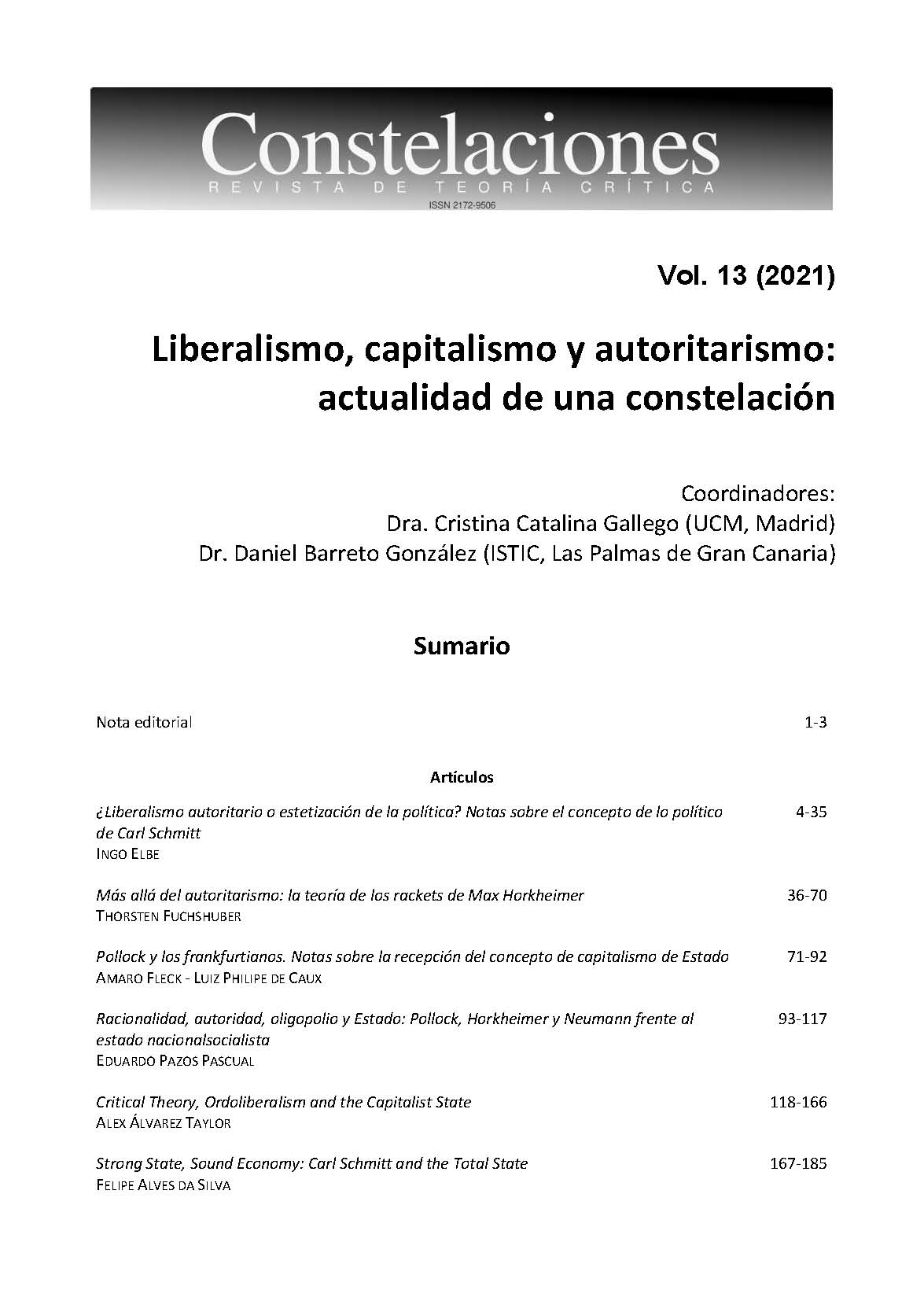Racionalidad, autoridad, oligopolio y Estado: Pollock, Horkheimer y Neumann frente al Estado nacionalsocialista
Abstract
This article aims to reconstruct the details of the dispute that, between the late 1930s and the early 1940s, confronted the collaborators of the Institut für Sozialforschung, with respect to the intimate nature and functioning of the German National Socialist State. It also attempts to combat the usual interpretation of the episode and to place the contents and approaches of the various authors in context. The internal dispute between several of the contributors - Max Horkheimer, Friedrich Pollock and Franz Neumann were the main ones involved - is one of the highlights of the first generation of critical theory. The reception of the debate in academia has long crystallized in a dualistic interpretation, according to which the core of the debate - the question of the type of capitalism prevailing in Germany and its relation to the foundations of the liberalism it was to replace - would have pitted the pair of directors of the Institut, Pollock and Horkheimer, against a thinker peripheral to the institution, Franz Neumann. The article tries to defend a different interpretation, according to which each of these thinkers should be understood as a voice of his own, in agreement and disagreement with his collaborators depending on the issue at hand. The article tries to show closeness between the ideas of Horkheimer and Neumann, or disagreements between Pollock and Horkheimer, which have been overlooked by the usual interpretation of the de
Downloads
References
COLOM, Francisco (1992): Las caras del Leviatán. Una lectura política de la teoría crítica, Barcelona: Anthropos.
DUBIEL, Helmut (1993): Leo Löwenthal, una conversación autobiográfica, Valencia: Alfons el Màgnanim.
FROMM, Erich (1984): Working Class in Weimar Germany: Psychological and Sociological Study. Oxford: Berg.
HOKHEIMER, Max (2016): “Los judíos y Europa”, Constelaciones, revista de teoría crítica, 4(4), 2-24.
HOKHEIMER, Max (1976): Sociedad en transición: estudios de filosofía social, Barcelona: Edicions 62.
HOKHEIMER, Max (1986): Ocaso, Madrid: Anthropos,
HOKHEIMER, Max (1998): Teoría Crítica, Buenos Aires: Amorrortu.
HOKHEIMER, Max (2000): Teoría tradicional y teoría crítica, Barcelona: Espasa.
LÓPEZ, Pablo (2010): “Behemoth, o la Ilustración devastada: reconsiderando a Franz Neumann”, Daimon, Revista Internacional de Filosofía, Suplemento 3, 207-214.
LÓPEZ, Pablo (2020): “Democracia, poder, derecho. Franz Neumann y la tragedia de la libertad moderna” en: Ante la catástrofe, Barcelona: Herder.
LÓPEZ, Pablo (2020): “La exigencia democrática: Franz Neumann en Weimar”, en J. L. Villacañas y J. Maiso (eds.): Laboratorio Weimar, la crisis de la globalización en Euroamérica (1918-1933), Madrid: Tecnos.
NEUMANN, Franz (1943): Behemoth, pensamiento y acción en el nacionalsocialismo, México, Fondo de Cultura Económica.
NEUMANN, Franz (1986): The Rule of Law, Political Theory and the Legal System in the Modern Society, Warwickshire, UK, Berg Publishers.
NEUMANN, Franz (1978): Über die Voraussetzungen und den Rechtsbegriff einer Wirtschaftsverfassung, en Wirtschaft, Staat, Demokratie, Fráncfort: Suhrkamp.
PAZOS PASCUAL, Eduardo (2020): El orden de hierro: una lectura de los textos del de-bate sobre el Estado alemán en el Institut für Sozialforschung (1939-1942). [Trabajo Fin de Máster] en E-prints UCM: https://eprints.ucm.es/63054/
POLLOCK, Friedrich (2019): “Capitalismo de Estado”, en Sobre el Capitalismo de Estado, Medellín, Ennegativo.
POLLOCK, Friedrich (2019): “¿Es el nacionalsocialismo un nuevo orden?” en Sobre el Capitalismo de Estado, Medellín: Ennegativo.
SOLLNER, Alfons (1984): Leftist students of the conservative revolution: Neumann, Kirchheimer, Marcuse, Telos, 61, 55-70. STIRK, Peter (1992): Max Horkheimer: A new interpretation, Maryland: Rowman & Littlefield. VILLACAÑAS, José Luis (2001): “Los límites de la influencia de Carl Schmitt en la República de Weimar”, Isegoría, Nº 24.
WIGGERSHAUS, Rolf (1995): The Frankfurt School, its history, theories, and political significance Massachusetts: MIT Press.
Downloads
Published
How to Cite
Issue
Section
License
Copyright (c) 2021 Eduardo Pazos Pascual

This work is licensed under a Creative Commons Attribution-NonCommercial-ShareAlike 4.0 International License.
Authors who have publications with this journal accept the following terms:
1. Authors will retain their copyright and grant the journal the right of first publication of their work, which will be simultaneously subject to the License of recognition of Creative Commons CC BY-NC-SA 4.0 that allows third parties to share, redistribute and adapt the work provided it is for non-commercial purposes and its author and first publication in this journal is indicated.
2. Authors may adopt other non-exclusive distribution license agreements for the version of the published work (e.g., depositing it in an institutional electronic archive or publishing it in a monographic volume) provided that the initial publication in this journal is indicated.
3. Authors are permitted and encouraged to disseminate their work via the Internet (e.g., in institutional telematic archives or on their website) before and during the submission process, which can produce interesting exchanges and increase citations of the published work. (See The Effect of Open Access).
Data confidentiality
1. Constelaciones. Revista de Teoría Crítica guarantees that the data you send us will only be used to meet the requests made in this message.
2. Your data will not be passed on to third parties.
3. You may request that your data be removed from our records at any time.





